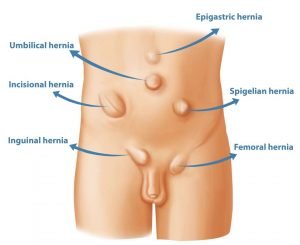Every year thousands of people visit doctors for the hernia treatment in Delhi. A hernia is a sac formed by the lining of the abdominal cavity (peritoneum). The sac passes through a hole or weak area in the strong layer of the abdominal wall surrounding the muscle, called the fascia.

The type of hernia you have depends on your location:
- Femoral hernia is a lump in the upper thigh, just below the groin. This type is more common in women than in men.
- Hiatal hernia occurs in the upper part of the stomach. A portion of the upper part of the stomach goes into the chest.
- Ventral hernia can occur through a scar if you have had abdominal surgery in the past.
- Umbilical hernia is a bump around the belly button. It happens when the muscle around the navel does not close completely after birth.
- Inguinal hernia is a lump in the groin. This type is more common in men. It can go down to the scrotum.
Causes
Usually, there is no clear cause for a hernia. Sometimes, they are presented by:
- Lift heavy objects
- Make effort when using the bathroom
- Perform any activity that raises the pressure inside the abdomen
Hernias may occur at birth, but the bump may not be noticeable until later in life. Some people have a family history of hernias.
Babies and children can develop hernias. This happens when there is a weakness in the abdominal wall. Inguinal hernias are common among children. Some children have no symptoms until they are adults.
Any activity or health problem that increases the pressure in the abdominal wall tissue and muscles can lead to a hernia, including:
- Chronic constipation and push (strain) strongly to defecate
- Chronic cough or sneezing
- Cystic fibrosis
- Enlarged prostate, effort to urinate
- Overweight
- Liquid in the abdomen
- Peritoneal dialysis
- Malnutrition
- Smoking
- Excessive effort
- Testicle that has not descended (Cryptorchidism)
Symptom
There are generally no symptoms. Some people have discomfort or pain. The discomfort may be worse when standing, straining or lifting heavy objects. Sooner or later, the most common complaint is a bulge that is sensitive and growing.
When a hernia is enlarged, it can get stuck inside the hole and lose its blood supply. This is called strangulation. Symptoms include:
- Nausea and vomiting
- Not being able to remove gas or have bowel movements
When it occurs, hernia surgery in Delhi is needed immediately.
Tests and exams
The laparoscopic surgeon in Delhi can usually see or feel the hernia when examined. You may be asked to cough, bend over, push or lift something. The hernia may enlarge when you do this.
The hernia (bump) may not be easily visible in babies and children, except when they are crying or coughing.
An ultrasound or CT scan may be done to look for a hernia.
If there is a blockage in the intestine, an x-ray of the abdomen will probably be taken.
Hernia Treatment in Delhi
Surgery is the only hernia treatment in Delhi with which a hernia can be permanently repaired. Surgery may be riskier for people with serious health problems.
The hernia surgery in Delhi repairs the weakened tissue of the abdominal wall (fascia) and closes any hole. Most hernias are closed with stitches and sometimes with patches of fabric to seal the hole.
An umbilical hernia that does not heal on its own when a child is 5 years old will probably be repaired.
Expectations (prognosis)
The clinical outcome (outcome) for most hernias is generally good with hernia treatment in West Delhi. It is uncommon for a hernia to reappear. Surgical hernias are more likely to reappear.
Possible complications
Rarely, the repair of an inguinal hernia can damage the structures involved in the functioning of a man’s testicles.
Another risk of surgery for a hernia is nerve damage, which can lead to numbness in the groin area.
If a part of the intestine was trapped or strangled before hernia surgery, intestinal perforation or death of the intestine may occur.
When to contact a medical professional
Check with your doctor immediately if:
- You have a painful hernia and the contents cannot be reintroduced into the abdomen using gentle pressure
- You have nausea, vomiting or fever along with the painful hernia
- You have a hernia that turns red, purple, dark or changes color
Call your doctor if:
- You have pain, swelling or a lump in the groin
- Has a lump or swelling in the groin or belly button, or that is related to a previous surgical incision
Prevention
To prevent a hernia:
- Use appropriate techniques to lift the weight.
- Lose weight in case of overweight.
- Relieve or avoid constipation by eating a lot of fiber, drinking plenty of fluids, going to the bathroom as soon as you feel like it and exercising regularly.
- Men should see urologist in Delhi if they make an effort to urinate, as this can be a symptom of an enlarged prostate.
